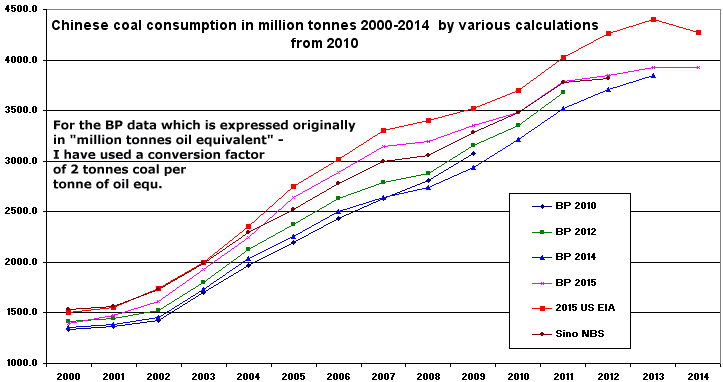For several years now I have been following China and other nations CO2 emissions history based on data assembled most years by BP who produce an easy to use xls spreadsheet – Recently we have seen news that coal consumption in China has been under-reported. Checking the China Meteorological Administration they emphasize – The research centers say Global carbon emissions nearly stalled in 2014. Then I see the US Energy Information Agency EIA has just revised Chinese coal consumption statistics – see charts here. So I decided to plot a chart comparing BP estimates of Chinese coal consumption over the years, against the new EIA numbers.

It looks as if BP has understated Chinese coal consumption by a large and increasing amount. Note the BP coal consumption figures are given in “million tonnes oil equivalent”. BP also say that 1 tonne oil equ = approx 1.5 t of hard coal. Now I have no way of knowing what proportion of the BP coal consumption numbers are for hard coal but assuming it is 100% the chart above results. This raises the issue as to what effect this might have on Chinese emissions of CO2. It all seems rather rubbery and needs sorting. And yet CoP21 sails on with certainty.
> “BP also say that 1 tonne oil equ = approx 1.5 t of hard coal”
This comparison is presumably made on a MJ/kg basis or something similar (apples to apples)
If so, BP need to publish with total transparency the arithmetic that allows the comparison. It is NOT straightforward, so my bet is that BP presents no such data for public consumption
I’ll bet most people at CoP21 don’t understand the difference between precision and accuracy, and assume the former means the latter.
Warwick, The specific energy of oil depends on the density (higher density lower specific energy due to more carbon and less hydrogen) and the sulphur content. A figure in the order of 40-42 Gj/tonne comes to mind. The Specific energy of coal depends on its classification (eg lignite, various grades of black coal), its shipped moisture (export coal normally shipped at a nominal 8%) and its ash content ( about 6% for metallurgical coal & 15% for steam coal). The SE of exported black coal is about 28-31 GJ/tonne. BP would have some idea about exports and imports but would have no exact data on internally mined and used coal in China. Nearly all Chinese coal is black coal mainly steam coal which is not suitable for modern steel production. It is very likely Chinese coal consumption is underestimated.
However, in the last year or so there has been a significant reduction in coal use for the following reasons 1/ start up of large hydro schemes particularly the 22,000 MW Three Gorges dam, 2/ start up of some large modern (more efficient) coal power plants, 3/ completion of many infrastructure projects (roads, rail, bridges, airports, ship ports etc) 4/ completed modernisation of many industry such as cement production, 5/ a deliberate financial hit at building to take out developer crooks and take the heat out of domestic building 6/ global down turn which has affected industrial exports 7/ maybe politics to get a hand out from stupid EU leaders and Obama over climate and also to get an advantage in Trade negotiations.
I have had a helpful email from an energy expert who suggested that 2 tonnes per tonne of oil equ. would be a more accurate conversion for an average of all coal consumed in China. Taking that on board the chart now looks like this.

I am a touch puzzled BP would quote the 1.5t figure suitable for hard coals.
> “I am a touch puzzled BP would quote the 1.5t figure suitable for hard coals”
From my first comment:
> “If so, BP need to publish with total transparency the arithmetic that allows the comparison. It is NOT straightforward, so my bet is that BP presents no such data for public consumption”
Just so. BP does NOT present transparent data and calculations, just self-serving assumptions. In earlier times, I had considerable experience with BP and their efforts at economic coal mining – they genuinely had no idea and made a real mess
I think this is all a bit of a con by the Chinese. Watch now how their consumption will appear to drop relative to the revised upward figures, whereas in fact it won’t, but will look good. Great way to reduce your so called carbon emissions.